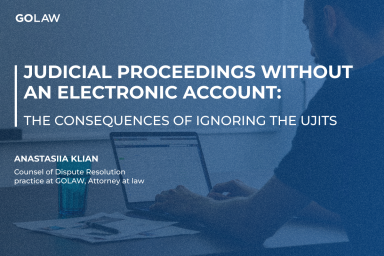A transaction concluded by a person who is not authorized to represent can not be approved
The plaintiff claimed that his apartment was not taken from his possession by his will but as a result of the illegal actions of another person who was not authorized to conclude the apartment sale and purchase agreement and acted based on a forged power of attorney. In evaluating this case, the Supreme Court found that the decision of the court of Kutná Hora in the Czech Republic, which entered into force, established the fact of forgery and fictitiousness of the power of attorney used to alienate the apartment.
Meanwhile, the person who concluded the transaction on behalf of the Czech company stated that the plaintiff had taken actions indicating the approval of the apartment sale and purchase agreement, namely, subsequently accepted its execution (the funds under the mentioned agreement were credited to the plaintiff’s account). In this regard, this person noted that a provision of Article 241 of the Civil Code of Ukraine (hereinafter – the Civil Code) regarding the subsequent transaction approval applies to the disputed legal relations.
Upholding the court decisions of the previous instances on the satisfaction of the claim, the Supreme Court came to the following conclusions.
Article 241 of the Civil Code stipulates that a transaction concluded by an attorney over his/her authority creates, modifies, or terminates a principal’s civil rights and obligations only if the principal subsequently approves the respective transaction.
The transaction is deemed approved, particularly if the principal took the actions indicating acceptance of this transaction for execution. This rule presumes that the attorney has a specified amount of powers duly and under the established procedure the principal granted to him/her.
Thus, the Supreme Court emphasized that the provision of Article 241 of the Civil Code as to the subsequent approval of a transaction cannot be applied to legal relations when the transaction is concluded on behalf of a person by another person who was not authorized to act as his/her principal’s attorney at all and therefore could not exceed any authority.
Resolution of the Supreme Court of January 18, 2023, in case No. 752/22077/19
Find more current court positions at the link: https://litigationinukraine.com/en/positions-of-courts/
Sign up to be aware
New achievements are inspired by information. GO further, don’t miss out GOLAW news and legal alerts
Our expertise
-
- Antitrust and Competition
- Banking and Finance
- Compliance, Corporate Governance and Risk Management
- Corporate and M&A
- Criminal and White Collar Defence
- Defense in Anti-corruption procedures and regulations
- Labor and Employment
- Natural Resources and Environment
- Government Relations (GR)
- Insolvency and Corporate Recovery
- Intellectual property
- International trade
- Legal support of business and private Сlients in Germany
- Litigation and dispute resolution
- Private clients
- Real Estate and Construction
- Energy and Natural Resources
- Restructuring, Claims and Recoveries
- Martial Law
- Tax and Customs
-
- Agribusiness
- Aviation
- Chemical industry
- Engineering, Construction and Building Materials
- Natural Resources and Environment
- Financial institutions
- IT and AI
- Industry and manufacturing
- Healthcare industries, Life sciences and Pharmaceuticals
- Media, Entertainment, Sports and Gambling
- Retail, FMCG and E-Commerce
- Transport and Logistics
We use cookies to improve performance of our website and your user experience.
Cookies policy
Cookies settings







